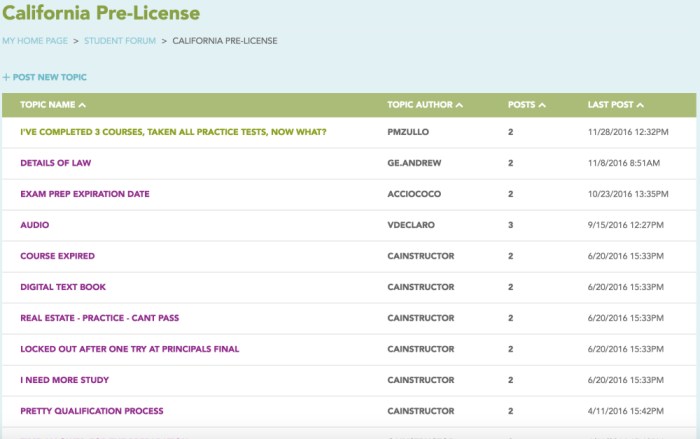As the Hawaii real estate practice exam takes center stage, this comprehensive guide delves into the intricacies of the exam, providing invaluable insights and strategies for aspiring real estate professionals. Embark on a journey to conquer this pivotal milestone, ensuring a smooth transition into the dynamic world of Hawaii real estate.
This meticulously crafted guide encompasses every aspect of the Hawaii real estate practice exam, empowering candidates with the knowledge and tools to excel. From understanding the exam format and content areas to mastering effective study techniques and exam-taking strategies, this guide serves as an indispensable companion throughout your preparation journey.
Hawaii Real Estate Exam Overview

The Hawaii real estate practice exam is a mandatory step for individuals seeking to obtain a real estate license in the state of Hawaii. This exam is designed to assess the knowledge and skills of candidates in various aspects of real estate practices, ensuring their competence and adherence to industry standards.
Exam Format and Content
The Hawaii real estate practice exam consists of 100 multiple-choice questions divided into three sections:
- Real Estate Principles (40 questions):Covers fundamental real estate concepts, laws, and regulations.
- Real Estate Practice (40 questions):Focuses on practical aspects of real estate transactions, including contracts, financing, and agency.
- Hawaii Real Estate Law (20 questions):Tests candidates’ understanding of Hawaii-specific real estate laws and regulations.
Candidates are given 180 minutes to complete the exam, and a passing score of 75% is required.
Eligibility and Application
To be eligible to take the Hawaii real estate practice exam, individuals must meet the following requirements:
- Be at least 18 years of age.
- Have completed an approved 60-hour pre-licensing education course.
- Submit a completed application to the Hawaii Real Estate Commission (HREC).
The application process involves providing personal information, education details, and payment of applicable fees. Upon approval, candidates will receive an exam scheduling notice from the HREC.
Study Materials and Preparation: Hawaii Real Estate Practice Exam

Passing the Hawaii real estate practice exam requires comprehensive preparation. This section provides essential resources and strategies to enhance your study efforts.
Textbooks, online courses, and practice tests are valuable resources for exam preparation. Textbooks offer a structured overview of the exam topics, while online courses provide interactive learning experiences. Practice tests simulate the actual exam format and identify areas for improvement.
Effective Study Methods
- Active Recall:Regularly test your knowledge by recalling information without referring to notes.
- Spaced Repetition:Review material at increasing intervals to enhance long-term retention.
- Focus on Key Concepts:Identify and prioritize the most important topics covered on the exam.
- Practice Time Management:Time yourself during practice tests to develop exam-taking strategies.
Study Schedule and Timeline
A well-structured study schedule is crucial for effective preparation. Allocate sufficient time for each topic and schedule regular practice tests. Adjust the timeline based on your individual pace and learning style.
Recommended Timeline:
- 3-6 months:Textbook study and online course completion.
- 1-2 months:Practice test and review of weak areas.
- 1-2 weeks:Final review and mock exams.
Remember, consistency and dedication are key to success on the Hawaii real estate practice exam. Utilize these resources and study strategies to maximize your preparation and achieve your goals.
Exam Content and Analysis

The Hawaii real estate practice exam covers a comprehensive range of topics essential for individuals seeking licensure as real estate agents or brokers in the state. Understanding the exam’s content and format is crucial for effective preparation and maximizing performance.
Key Content Areas
The exam encompasses several key content areas, including:
- Real Estate Principles and Practices
- Real Estate Law
- Real Estate Finance
- Real Estate Appraisal
li>Real Estate Brokerage
Specific Topics and Concepts
Within each content area, candidates are expected to master specific topics and concepts. These include:
- Real Estate Principles and Practices:Concepts of real estate ownership, types of properties, contracts, agency relationships, ethics, and fair housing.
- Real Estate Law:Federal and state laws governing real estate transactions, including contract law, property law, landlord-tenant law, and environmental regulations.
- Real Estate Finance:Mortgage types, loan processes, underwriting criteria, and financial analysis for real estate investments.
- Real Estate Appraisal:Methods for valuing properties, including market, cost, and income approaches, as well as factors influencing property values.
- Real Estate Brokerage:Principles of real estate brokerage, including agency relationships, listing agreements, and closing procedures.
Practice Questions
To illustrate the types of questions candidates may encounter on the exam, consider the following practice scenarios:
- Real Estate Principles and Practices:Explain the different types of agency relationships in real estate and their implications for agents and clients.
- Real Estate Law:Describe the legal requirements for a valid real estate contract in Hawaii.
- Real Estate Finance:Calculate the monthly mortgage payment for a $500,000 property with a 30-year fixed-rate loan at 5%. Assume a down payment of 20% and an annual property tax rate of 1.5%.
- Real Estate Appraisal:Use the sales comparison approach to value a single-family home in Honolulu. Provide an analysis of comparable properties and explain how they support your valuation.
- Real Estate Brokerage:Discuss the steps involved in listing a property for sale, including marketing strategies and agency disclosure requirements.
Exam-Taking Strategies

Approaching the Hawaii real estate practice exam requires a well-planned strategy to optimize time management and question selection. Understanding the exam format, time constraints, and question types is crucial for success.
Effective time management involves allocating time wisely to each section and question. Prioritize answering questions you are confident about first, leaving ample time for more challenging ones. Utilize the scratch paper provided to jot down notes, calculations, or formulas as needed.
Question Selection, Hawaii real estate practice exam
When selecting questions, begin with those that carry higher point values. This maximizes your potential score. Carefully read each question and identify the key terms and concepts. If unsure about a question, move on and return to it later if time permits.
Handling Difficult Questions
Difficult questions can be approached by breaking them down into smaller parts. Identify the specific areas of confusion and focus on understanding the concepts involved. Use the process of elimination to rule out incorrect answers. If possible, seek clarification from the exam proctor.
Avoiding Common Pitfalls
Avoid common pitfalls such as rushing through the exam or neglecting to read questions thoroughly. Carefully consider each answer choice and eliminate those that are clearly incorrect. Stay calm and focused throughout the exam, as panic can lead to mistakes.
Staying Calm and Focused
Maintaining composure during the exam is essential. Practice relaxation techniques such as deep breathing or visualization exercises beforehand. Focus on the task at hand and avoid distractions. If feeling overwhelmed, take a moment to pause and regroup.
Exam Results and Next Steps

Once you have completed the Hawaii real estate exam, you will receive your results within two to three weeks. The results will be sent to the email address you provided when you registered for the exam.
The passing score for the Hawaii real estate exam is 70%. If you pass the exam, you will be eligible to apply for a real estate license. If you fail the exam, you will need to retake it.
Consequences of Failing the Exam
If you fail the Hawaii real estate exam, you will need to wait 30 days before you can retake it. You will also need to pay a retake fee.
There is no limit to the number of times you can retake the Hawaii real estate exam. However, it is important to note that each time you retake the exam, you will need to pay a retake fee.
Obtaining a Real Estate License
Once you have passed the Hawaii real estate exam, you will need to apply for a real estate license. You can apply for a license online or by mail.
To apply for a real estate license, you will need to submit the following:
- A completed application form
- A copy of your passing exam score
- A fee
Once your application has been approved, you will be issued a real estate license. Your license will be valid for two years.
Continuing Education Requirements
Once you have obtained a real estate license, you will be required to complete continuing education courses every two years. These courses will help you stay up-to-date on the latest laws and regulations affecting the real estate industry.
You can find continuing education courses offered by a variety of providers. You can also find online continuing education courses.
Question Bank
What is the purpose of the Hawaii real estate practice exam?
The Hawaii real estate practice exam is a mandatory requirement for obtaining a real estate license in the state of Hawaii. It assesses candidates’ knowledge and understanding of real estate principles and practices.
What are the eligibility requirements for taking the exam?
To be eligible to take the Hawaii real estate practice exam, candidates must be at least 18 years old, have a high school diploma or equivalent, and complete 60 hours of pre-licensing education.
What are the key content areas covered on the exam?
The Hawaii real estate practice exam covers a wide range of topics, including real estate law, contracts, financing, appraisal, property management, and ethics.
What are some effective study methods for preparing for the exam?
Effective study methods include studying the official exam guide, taking practice tests, joining a study group, and seeking professional tutoring.

